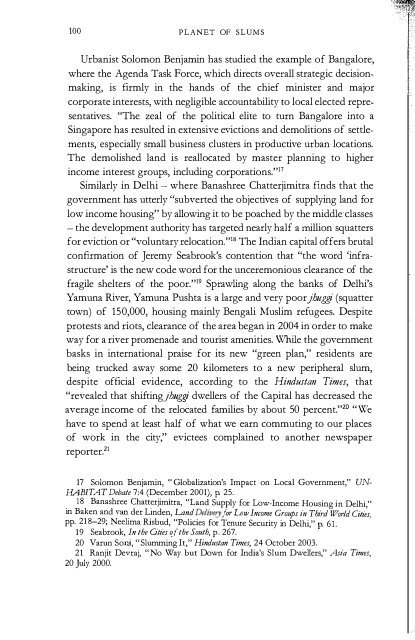Untitled - Rebel Studies Library
Untitled - Rebel Studies Library
Untitled - Rebel Studies Library
You also want an ePaper? Increase the reach of your titles
YUMPU automatically turns print PDFs into web optimized ePapers that Google loves.
100 PLANET OF SLUMS<br />
Urbanist Solomon Benjamin has studied the example of Bangalore,<br />
where the Agenda Task Force, which directs overall strategic decisionmaking,<br />
is firmly in the hands of the chief minister and major<br />
corporate interests, with negligible accountability to local elected representatives.<br />
"The zeal of the political elite to turn Bangalore into a<br />
Singapore has resulted in extensive evictions and demolitions of settlements,<br />
especially small business clusters in productive urban locations.<br />
The demolished land is reallocated by master planning to higher<br />
income interest groups, including corporations."17<br />
Similarly in Delhi - where Banashree Chatterjimitra finds that the<br />
government has utterly "subverted the objectives of supplying land for<br />
low income housing" by allowing it to be poached by the middle classes<br />
- the development authority has targeted nearly half a million squatters<br />
for eviction or "voluntary relocation."18 The Indian capital offers brutal<br />
confirmation of Jeremy Seabrook's contention that "the word 'infrastructure'<br />
is the new code word for the unceremonious clearance of the<br />
fragile shelters of the poor."19 Sprawling along the banks of Delhi's<br />
Yamuna River, Yamuna Pushta is a large and very poorjhuggi (squatter<br />
town) of 150,000, housing mainly Bengali Muslim refugees. Despite<br />
protests and riots, clearance of the area began in 2004 in order to make<br />
way for a river promenade and tourist amenities. %ile the government<br />
basks in international praise for its new "green plan," residents are<br />
being trucked away some 20 kilometers to a new peripheral slum,<br />
despite official evidence, according to the Hindustan Times, that<br />
"revealed that shiftingJhuggi dwellers of the Capital has decreased the<br />
average income of the relocated families by about 50 percent."20 "We<br />
have to spend at least half of what we earn commuting to our places<br />
of work in the city;' evictees complained to another newspaper<br />
reporter.21<br />
17 Solomon Benjamin, "Globalization's Impact on Local Government," UN<br />
HABITAT Debate 7:4 (December 2001), p 25.<br />
.<br />
18 Banashree Chatterjimitra, "Land Supply for Low-Income Housing in Delhi,"<br />
In Baken and "an der Linden, Land Deliver} for Low Income Groups in Third World Cities,<br />
pp. 218-29; Neelima Risbud, "Policies for Tenure Security in Delhi," p 61.<br />
19 Seabrook, In the Cities of the South, p. 267.<br />
20 Varun Som, "Slumming It," Hindustan Times, 24 October 2003.<br />
21 Ranjit Devraj, "No Way but Down for India's Slum Dwellers," Asia Times,<br />
20 July 2000.<br />
HAUSSMANN IN THE TROPICS 101<br />
Urban Mrica, of course, has been the scene of repeated forced<br />
exoduses to clear the way for highways and luxury compounds. One of<br />
the most notorious and heartbreaking - rivaling Apartheid's demolitions<br />
of Sofiatown and Crossroads - was the destruction of Maroko in<br />
Lagos in 1990. A former fishing village at the swampy end of Lekki<br />
Peninsula, Maroko was colonized by poor people displaced in the late<br />
1950s "so that Victoria Island and Ikoyi could be drained and developed<br />
for Europeans and wealthy Africans." Although impoverished,<br />
Maroko became famous for its populistjoie de vivre, dark humor and<br />
spectacular music. By the early 1980s, the once marginal Lekki<br />
Peninsula itself was considered a prime site for the extension of highincome<br />
residences. The 1990 bulldozing of Maroko left 300,000<br />
homeless.22 "Few Nigerians alive," writes the poet Odia Ofeimun, "can<br />
forget the sense of betrayal and the trauma of severance that was occasioned<br />
when it happened under military jackboots. It was memorialized<br />
across Nigerian literature in poetry, drama and prose.'>23<br />
Under the regime of Daniel Arap Moi, Nairobi's political bosses and<br />
influential slumlords were allowed to build rental tenements on public<br />
land earmarked for roads, including a 60-meter strip through the heart<br />
of Kibera. Now the post-Moi government of President Mwai Kibaki<br />
wants to "restore order" to planning by clearing out more than onethird<br />
million tenants and squatters.24 During recent demolitions,<br />
residents - many of whom had been conned into investing their lives'<br />
savings into buying plots already dedicated to roads - were told by<br />
heavily armed police that they had a scant two hours to evacuate their<br />
homes.25<br />
When it comes to the reclamation of high-value land, ideological<br />
symbols and promises made to the poor mean very little to the bureaucrats<br />
in power. In Communist-governed Kolkata, for example,<br />
squatters have been evicted from the center to the edge, then evicted<br />
22 Margaret Peil, "Urban Housing and Services in Anglophone West Africa,"<br />
p. 178.<br />
23 Odia Ofeimun, "Invisible Chapters and Daring Visions," This Day, 31 July<br />
2003. Some examples: Ogaga Ifowodo, Red Rain (originally, Maroko} Blood); Maik<br />
Nwosu, Invisible Chapters; J.P. Clark, "Maroko" (in A Lot From Paradise); and Chris<br />
Abani's deliriously wonderful Grace/and.<br />
24 Vasagar, "Bulldozers Go in to Clear Kenya's Slum City."<br />
25 See articles in The East African Standard (Nairobi), 8-9 February 2004.


